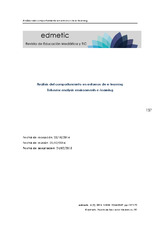Mostrar el registro sencillo del ítem
Análisis del comportamiento en entornos de e-learning
| dc.contributor.author | Gonçalves, Sérgio | |
| dc.contributor.author | Carneiro, Davide | |
| dc.contributor.author | Fdez-Riverola, Florentino | |
| dc.contributor.author | Novais, Paulo | |
| dc.date.accessioned | 2016-05-10T12:25:08Z | |
| dc.date.available | 2016-05-10T12:25:08Z | |
| dc.date.issued | 2015 | |
| dc.identifier.issn | 2254-0059 | |
| dc.identifier.uri | http://hdl.handle.net/10396/13516 | |
| dc.description.abstract | La evaluación representa un aspecto determinante en la elaboración de estrategias de éxito durante el aprendizaje. En un contexto presencial, el docente puede observar el comportamiento de sus alumnos e identificar diferentes vías que faciliten la evaluación sin inducir al estrés, evitando las consecuencias negativas de éste en el resultado del aprendizaje. Sin embargo, en entornos de aprendizaje con e-Learning el contacto directo resulta imposible y, por lo tanto, deben existir formas alternativas que faciliten tanto la detección como la prevención de situaciones de estrés durante la evaluación. Resulta por tanto conveniente el análisis del estrés y la determinación de estrategias para la resolución de problemas derivados de su aparición. En este trabajo se propone un módulo de análisis de estrés para su aplicación durante la evaluación on-line de los alumnos, que es capaz de indicar al docente los instantes de tiempo más propicios para intervenir así como los contenidos que causan mayores dificultades. De esta forma, el educador podrá asistir de forma eficaz a aquellos alumnos que más lo necesiten. | es_ES |
| dc.description.abstract | The evaluation is a determining factor in developing successful strategies for learning. In a classroom context, the teacher can observe the behavior of students and identify different ways to facilitate the assessment without inducing stress, avoiding the negative consequences of this on the result of learning. However, in learning environments eLearning direct contact is impossible and, therefore, there should be alternative ways to provide both detection and prevention of stress during the evaluation. It is therefore appropriate stress analysis and identification of strategies for solving problems arising from its appearance. In this work, a stress analysis module for use is proposed for the online student assessment, which is capable of indicating to the teaching moments more propitious time to intervene and the contents that cause greater difficulties. In this way, the teacher can effectively assist students who need it most. | es_ES |
| dc.format.mimetype | application/pdf | es_ES |
| dc.language.iso | spa | es_ES |
| dc.publisher | Universidad de Córdoba, UCOPress | es_ES |
| dc.rights | https://creativecommons.org/licenses/by/3.0/ | es_ES |
| dc.source | Edmetic 4(2), 137-172 (2015) | es_ES |
| dc.subject | Enseñanza a distancia | es_ES |
| dc.subject | Inteligencia artificial | es_ES |
| dc.subject | Estrés | es_ES |
| dc.subject | Rendimiento típico | es_ES |
| dc.subject | Distance learning | es_ES |
| dc.subject | Artificial intelligence | es_ES |
| dc.subject | Stress | es_ES |
| dc.subject | Typical performance | es_ES |
| dc.title | Análisis del comportamiento en entornos de e-learning | es_ES |
| dc.title.alternative | Behavior analysis enviroments e-learning | es_ES |
| dc.type | info:eu-repo/semantics/article | es_ES |
| dc.relation.publisherversion | http://www.uco.es/ucopress/ojs/index.php/edmetic/index | es_ES |
| dc.rights.accessRights | info:eu-repo/semantics/openAccess | es_ES |

